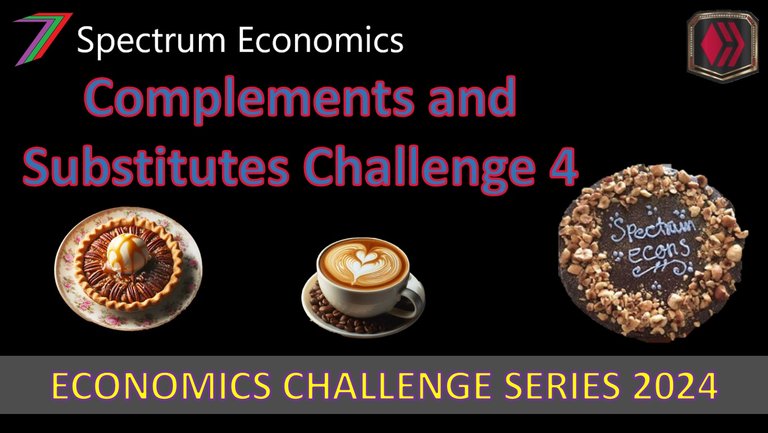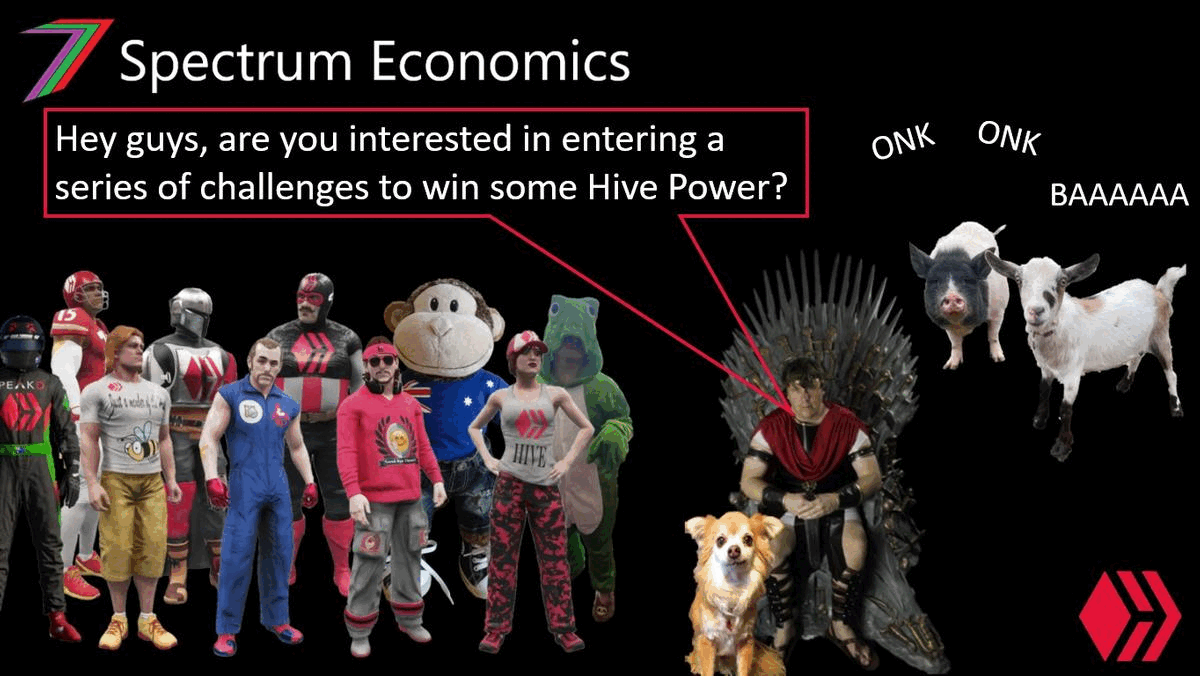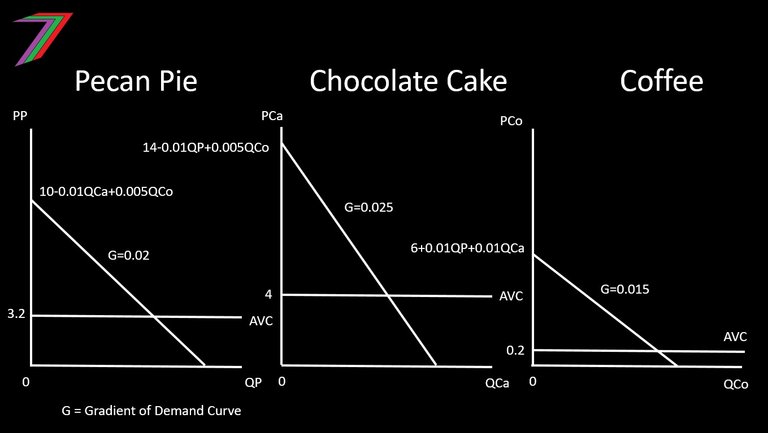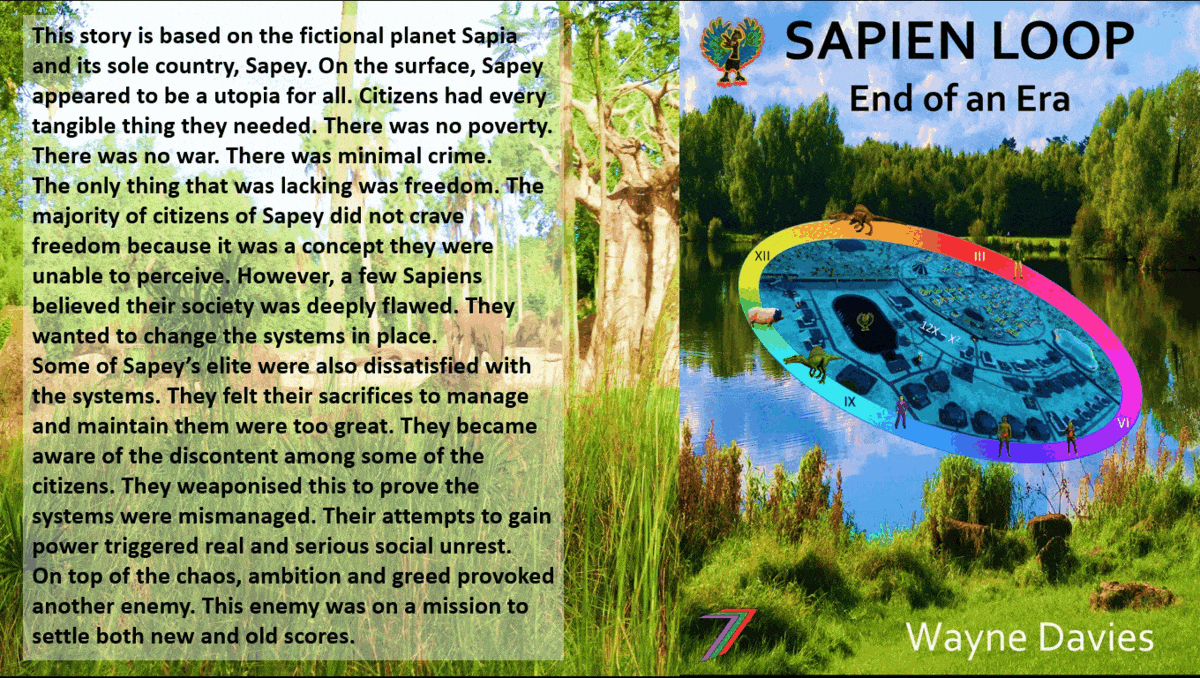Hi Everyone,

Welcome to the Economics Challenge Series for 2024. For July and August, I am running an economics challenge series. The series consists of seven challenges. All the challenges will commence in July and early August. I will publish and announce the results in August.
Six of the seven challenges from last year's Challenge Series return. The Tax Game from 2022 is replacing the business version of the Buying and Selling Game. Below is the list of challenges.
- Challenge 1: Ice Cream Game
- Challenge 2: Game Theory Game
- Challenge 3: Pick-a-Door
- Challenge 4: Complement vs. Substitute
- Challenge 5: The Buying and Selling Game
- Challenge 6: Even-to-Win
- Challenge 7: Tax Game
Each challenge could reward winners with as much as 60 Hive Power. The value of the prize will depend on the level of participation. For each new participant, the prize will increase by 5 Hive Power. This will continue until 60 Hive Power is reached (12 participants). The first 12 participants will also receive a 50% upvote from this account.
In addition to the prize money, the top few participants will be given points. These points will be used to determine the overall challenge series winner. This winner may receive as much as 80 Hive Power. The value of the prize will equal the sum of the number of participants across all challenges. This will continue until 80 Hive Power is reached.

For more information on the challenge series and the upcoming challenges, I recommend that you read my post from last year. This year’s Challenge Series is run the same way as last year’s.
Welcome to Challenge 4: Complements and Substitutes
How to Play?
In this challenge, participants are required to price two food items and one drink sold at the same store. For this challenge, the two food items are pecan pies and chocolate cakes, and the drink is coffee.
Pecan pie and chocolate cake are assumed to be substitutes for each other, and coffee is assumed to be complementary to both pecan pie and chocolate cake. If the food items are substitutes, they are in competition with each other. If a person buys a pecan pie, they are assumed to be less likely to buy a chocolate cake. Food and drink are often complementary. Buying one encourages the buying of the other. We assume eating a chocolate cake or a pecan pie makes some people thirsty. However, many people may still wish to buy just one item on its own. Therefore, they are not perfectly complementary.
The participants are required to set the prices of the pecan pies, chocolate cakes, and coffee. The aim is to maximise total profits. Participants are provided with variable costs and inverse demand functions for the food and drink items. There are no fixed costs, and participants are not required to work within a budget. For this question, no information is required to be generated by any model.
This is a more technical challenge. Participants should be familiar with economic concepts such as demand, supply, complements, and substitutes. The following theoretical posts could be useful.
Economic Concepts #3 - Substitutes vs. Complements
Economic Concepts #5 - Demand, Supply and Equilibrium
Economic Concepts #9 – Price elasticity of demand
Last year's challenge posts might be helpful as well. See posts below:
Economics Challenge Series – Challenge 3: Complements and Substitutes
Economics Challenge Series – Challenge 3: Complements and Substitutes Results
The winner is the participant with the highest profit. If two participants obtain the same profit, the participant who entered first wins.
All entries must be made in the comments section of this post.
Each account is only permitted one entry.
Objectives of the Game
The objective of the game is to make the highest profit from the sale of pecan pies, chocolate cakes, and coffees. If two or more participants make the exact same profit, the participant who entered first wins.
Game Information and Assumptions
- Demand is determined by the inverse demand functions provided in the question.
- Supply is assumed to always meet demand (e.g., no shortages if demand is high and no excess or wasted food if demand is low).
- Variable costs per food or drink item are provided.
- Variable cost per food or drink item does not change as quantity increases or decreases. (e.g., the cost of the first pie is the same as the tenth pie). Therefore, average variable costs are constant.
- There are no fixed costs.
- Based on the above assumptions regarding costs, we can also assume that average variable costs equate to average costs.
- Participants are not constrained by a budget.
How are the Results of the Game Determined?
The quantities sold are determined mathematically based on the inverse demand functions provided. Profits are determined by subtracting total costs from total revenue. Total cost is calculated by multiplying quantity by variable costs per item (i.e., average variable costs). Total revenue is calculated by multiplying the quantity sold by the price. No values need to be generated by a model. Participants can calculate their profit using the information in the question.
Challenge Prizes
The total prize for this challenge could reach as high as 60 Hive Power. The number of participants determines the value of the prize. For every entry, the prize is increased by 5 Hive Power until a value of 60 Hive Power is reached. The winner will receive 2/3 of the prize, and second place will receive 1/3. The first 12 entries will be given upvotes. The winner of this challenge will be given 40 points and second place 20 points. These points will be tallied at the end of the challenge series to determine the overall winner.
Let the Challenge Begin!
Participants are running a food stall that sells pecan pies, chocolate cakes, and coffee. They are required to price both food items and the drink. Below are the inverse demand functions (i.e., price expressed as a function of quantity) and the average variable costs for both food items and the drink.
Inverse Demand Functions
PP = 10 – 0.02QP – 0.01QCa + 0.005QCo
PCa = 14 – 0.025QCa – 0.01QP + 0.005QCo
PCo = 6 – 0.015QCo + 0.01QP + 0.01QCa
Variable Costs
AVCP = 3.2
AVCCa = 4
AVCCo = 0.2
Legend:
PP: Price for pecan pies
PCa: Price for chocolate cakes
PCo: Price for coffee
QP: Quantity for pecan pies
QCa: Quantity for chocolate cake
QCo: Quantity for coffee
AVCP: Average Variable Cost of Pecan Pies
AVCCa: Average Variable Cost of Chocolate Cake
AVCCo: Average Variable Cost of Coffee
The above equations can also be represented graphically. See the graph below.

Entry Format
For this challenge, I expect to see entries made in the following format:
Prices:
Pecan Pies: $X
Chocolate Cake: $Y
Coffee: $Z
Example of Entry
Prices:
Pecan Pies: $2.20
Chocolate Cakes: $5.20
Coffee: $0.80
The closing date and time for this challenge is 6PM coordinated universal time (UTC) 28/07/2024. Responses after this time will not be accepted. The winners will be announced in the results post.
I hope everyone has fun and enjoys the fourth challenge. I look forward to your participation in the remaining challenges. If you have any questions, feel free to ask in the comments section.
My New Book, Sapien Loop

I have published an ebook on Amazon; it is titled ‘Sapien Loop: End of an Era’. The book is fiction. I do not normally write fiction. However, I felt it was appropriate considering what is happening in the world today. Freedom is the most important thing we have, but we are gradually losing it. I have covered this in many of my posts.
In the story, most citizens do not understand the concept of freedom because they have never really experienced it. In essence, the story is about an alien world that might represent our not-so-distant future. There are many other elements to the story that are an abstract and exaggerated version of our reality. I believe this book to be an important read, and I believe it has the potential to change the way you think.
Brief Summary of Sapien Lopp

This story is based on the fictional planet Sapia and its sole country, Sapey. Sapey is portrayed as a form of utopia for all its citizens. No poverty. No war. Almost no crime. Opportunities for all.
This was enough for most citizens, but not all. In one of the small regions, some of the citizens had become discontent. They felt something important was missing in their lives. Their discontent did not go unnoticed. Some of the Sapey elite wanted to weaponise this discontent to gain more power. This created more chaos than they anticipated. This led to further widespread social unrest.
On top of the chaos, ambition and greed provoked another enemy. This enemy was on a mission to settle both new and old scores.
If you want to buy a copy of the book, below are links to the relevant Amazon websites for each country it is available in. The book is priced at approximately US$5.08.
- Amazon USA
- Amazon UK
- Amazon Germany
- Amazon France
- Amazon Spain
- Amazon Italy
- Amazon Netherlands
- Amazon Japan
- Amazon Brazil
- Amazon Canada
- Amazon Mexico
- Amazon Australia
- Amazon India
I am also running monthly contests where participants are required to answer questions based on the book. The prize is 30 Hive Power plus upvotes for the first twelve entries. You can recover the cost of the book with just one win.
Hive: Future of Social Media

Spectrumecons on the Hive Blockchain

Prices:
Pecan Pies: $6.39
Chocolate Cake: $8.99
Coffee: $4.89
Prices:
Pecan Pies: $2.80
Chocolate Cakes: $4.60
Coffee: $0.60
Prices:
Pecan Pies: $3.00
Chocolate Cakes: $5.00
Coffee: $1.50
Prices:
Pecan Pies: $3.30
Chocolate Cakes: $5.15
Coffee: $1.90
Prices:
Pecan Pies: $3.00
Chocolate Cakes: $5.00
Coffee: $2.00
Prices:
Pecan Pies: 2.99$
Chocolate Cakes: 4.98$
Coffee: 0.89$
Prices:
Pecan pies: $2.5
Chocolate cakes: $4.5
Coffee: $3
Prices:
Pecan Pies: $3.05
Chocolate Cakes: $5.10
Coffee: $1.90
Prices:
Pecan Pies: $3.52
Chocolate Cakes: $4.88
Coffee: $1.45
Prices:
Pecan pies: $3.12
Chocolate cakes: $4.80
Coffee: $0.70
Prices:
Pecan Pies: $3.50
Chocolate Cakes: $5.50
Coffee: $2.00
This post has been manually curated by @steemflow from Indiaunited community. Join us on our Discord Server.
Do you know that you can earn a passive income by delegating to @indiaunited. We share more than 100 % of the curation rewards with the delegators in the form of IUC tokens. HP delegators and IUC token holders also get upto 20% additional vote weight.
Here are some handy links for delegations: 100HP, 250HP, 500HP, 1000HP.
100% of the rewards from this comment goes to the curator for their manual curation efforts. Please encourage the curator @steemflow by upvoting this comment and support the community by voting the posts made by @indiaunited.
You've been curated by @plantpoweronhive! Delegations welcome!
@tipu curate
Upvoted 👌 (Mana: 44/54) Liquid rewards.